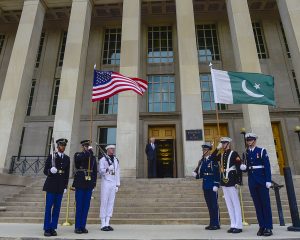As President-elect Joe Biden’s inauguration on January 20 draws closer, Islamabad is rife with speculations on what to expect from the incoming administration in Washington D.C.
Here are some of the issues that are expected to dominate discussions between Islamabad and Washington under Biden’s presidency.
Pakistan can anticipate some relief when it comes to aid money that President Donald Trump suspended in 2018 over Islamabad’s failure to take action against militant groups. Trump accused Pakistan of offering “nothing but lies and deceit” when he canceled a crucial Coalition Support Fund for Islamabad. The cancellation of the aid may have cost Pakistan billions of dollars in military and civilian aid over the last two years – something that pinched Islamabad hard at a time of financial crunch. It is possible that that the Biden administration may resume a part of the funding to reward Pakistan for its support in Afghanistan and in an attempt to keep diplomacy at play.
Pakistan can also expect to have more functioning, coordinated, and enhanced cooperation on military training programs under Biden. Trump had suspended Pakistan’s participation in the International Military Education and Training Program (IMET) for more than a year. IMET allows foreign military officers to train at U.S. military education institutions, such as the U.S. Naval War College and the U.S. Army War College. The termination of the program in 2018 canceled at least 66 slots set aside that year for Pakistani military officers in different military institutions in the United States. It is important to note here that Pakistan’s military gives the highest significance to training programs for junior ranks. On the other hand, “The U.S. military traditionally has sought to shield such educational programs from political tensions, arguing that the ties built by bringing foreign military officers to the United States pay long-term dividends,” as a Reuters story on the news noted. For more than a decade, IMET has been a pillar of U.S.-Pakistani military ties. The program survived all political tensions of Obama’s eight years, including the killing of Osama bin Laden in Pakistan, which plunged bilateral relations to an all-time low. It is possible that under the Biden administration, Pakistan’s military training program could resume.
Islamabad can expect to get plenty of appreciation from the Biden administration for its cooperation in the Afghan peace process. It is likely that Pakistan will attempt to keep the Afghan peace process at the forefront of its cooperation with the U.S. under Biden. At this point, there is no clarity if the Biden administration will respect Trump’s agreement with the Taliban to withdraw all U.S. troops from Afghanistan. The Afghan Taliban have already told the incoming administration in the United States to stick to the troop withdrawal deal. “The Islamic Emirate would like to stress to the new American president-elect and future administration that implementation of the agreement is the most reasonable and effective tool for ending the conflict between both our countries,” the Afghan Taliban said in a statement. We can expect things to get worse, with the Taliban hardening their position, if Biden announces the U.S. will keep some level of troops presence in the country. In any case, Pakistan would like to keep the Biden administration happy to ensure the above-mentioned gains.
On the Financial Action Task Force (FATF) front, Pakistan is unlikely to get relief in the form of getting off the grey list. While Pakistan has made good progress on many points related to money laundering, terror financing, and holding militants accountable, this is unlikely to become a decisive factor when it comes to Pakistan’s fate at the forum. The Biden administration would know that pressure asserted from the forum has resulted in crucial gains and remains a key leverage to get further concessions from Islamabad. The forum is likely to keep asking for more work from Islamabad and will continue to add more to the agenda for Pakistan’s case. Pakistan shouldn’t expect a decisive intervention from the incoming administration just because Islamabad has cooperated in Afghanistan and done some good home work at home. Washington’s broader interests in Asia, including relationships with India and China, will determine its policy at the forum.

































